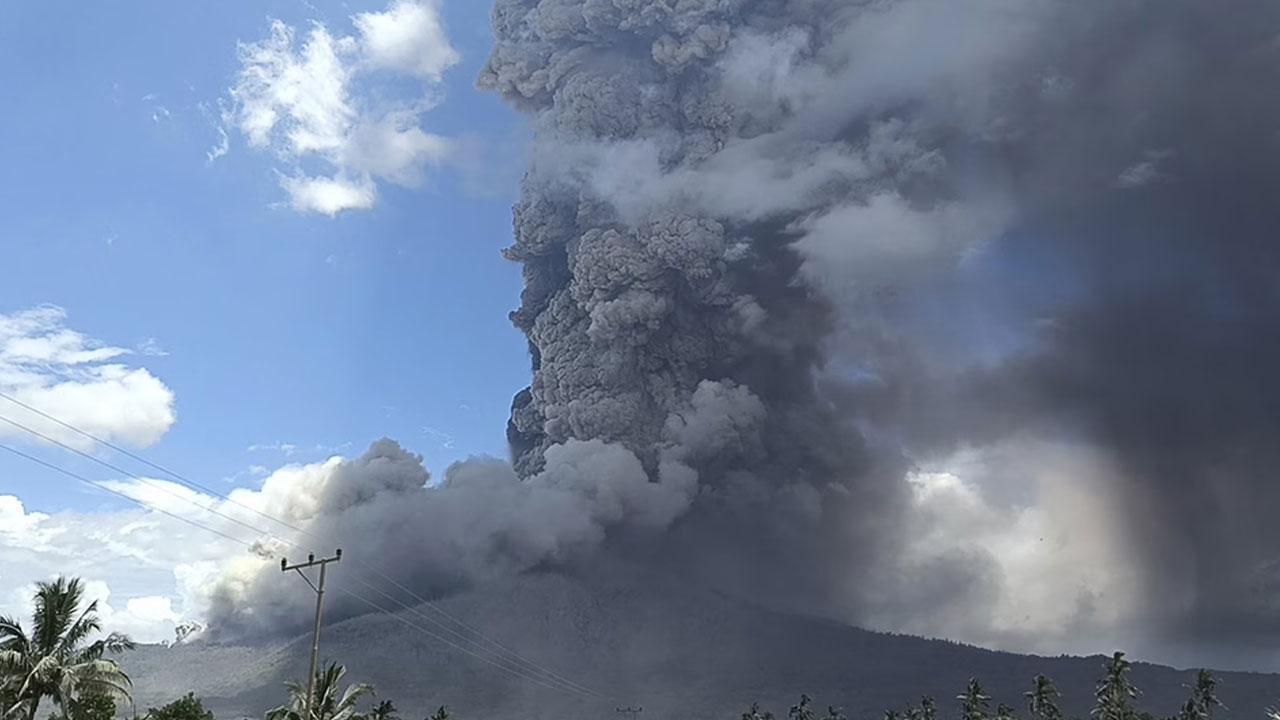
Post by : Raina Mansoor
Photo : X
At least three airlines suspended flights between Australia and Bali this week, following a volcanic eruption in eastern Indonesia that unleashed a massive plume of ash into the sky. While travelers understandably feel disappointed and frustrated by their disrupted plans, it is essential to understand why these cancellations are a crucial safety measure.
Why is Volcanic Ash Dangerous for Aircraft?
Volcanic ash is highly hazardous for aircraft, and the risks extend beyond the inconvenience caused by delays. When a volcano erupts, the ash that is ejected into the atmosphere is composed of fine particles that are both abrasive and potentially catastrophic for the aircraft.
One of the main dangers lies in how volcanic ash affects the visibility through a plane's windscreen. Imagine the effect of sandpaper on a spectacle lens. The ash particles are so fine and sharp that they can scratch and permanently damage the aircraft's windscreen, often rendering it opaque. This makes visibility for the pilots extremely poor, and it is akin to trying to see through scratched glasses that have been rubbed with sandpaper.
Stay informed with the latest news. Follow DXB News Network on WhatsApp Channel
But the hazards do not stop at visibility. Volcanic ash particles are so abrasive that they can damage the plane's external sensors, which help monitor and manage essential systems. This could lead to erroneous readings, making the aircraft's control systems unreliable. The ash can also infiltrate the aircraft’s ventilation system, posing potential health risks for passengers by contaminating the cabin air, which could lead to respiratory issues.
However, the greatest danger volcanic ash poses is to the engines. Jet engines rely on precise airflow to function properly. When ash enters the engines, the particles melt due to the high temperatures inside and begin to build up. This disruption of airflow can cause the engines to stall, or “flame out.” In severe cases, this could lead to a total loss of power, leaving the aircraft in peril.
Volcanic ash contains a significant amount of silica, which melts and becomes similar to glass when exposed to the extreme heat inside a jet engine. This melted glass-like material can clog up crucial components, such as the fuel injectors and turbine blades, making it difficult or impossible for the engine to operate correctly.
A Historical Incident
A notable example of the dangers volcanic ash poses to aviation occurred in 1982. A British Airways Boeing 747, flying near Indonesia, flew into a volcanic ash cloud from Mount Galunggung on Java. As a result, the aircraft lost all four of its engines. Miraculously, the crew was able to restart the engines and safely land the plane, despite the fact that the pilots could not see through the heavily scratched windscreen.
How Airlines Decide to Cancel Flights
Airlines take these safety risks extremely seriously, and the decision to cancel flights due to volcanic ash is made based on careful risk assessment and analysis. Each airline has its own operational team tasked with monitoring and evaluating real-time data from volcanic eruptions, including the size and spread of the ash cloud.
The team assesses how far the ash is traveling, factoring in variables such as wind patterns at different altitudes. Ash clouds can travel vast distances depending on wind speed and direction, making it difficult to predict exactly where the danger zones will be. Meteorological agencies around the world, in coordination with the International Civil Aviation Organization (ICAO), issue warnings and guidance on volcanic hazards, ensuring that airlines have the information they need to make informed decisions.
Australia’s Civil Aviation Safety Authority (CASA) requires all airlines to have a robust risk management process in place. Airlines work together and share information, which means that some may choose to cancel flights earlier than others. However, sophisticated airlines tend to come to similar conclusions based on the available data. The decision is always made with passenger safety as the priority.
Before flights can resume after a volcanic eruption, the ash must have cleared from the air, and airlines must be confident that the risk of further eruptions is low. This ensures that there is no longer a threat to the aircraft, the crew, or passengers.
Passenger Safety is the Priority
Though it’s disappointing for travelers whose holidays are interrupted by flight cancellations, it’s crucial to remember that these measures are designed to protect their safety. Volcanic ash can severely impact a plane’s ability to fly safely, and the potential for engine failure or poor visibility is a real and serious concern.
By grounding flights, airlines are making the right call. As frustrating as delays can be, they are a small price to pay for ensuring that passengers are not put in harm's way. The decision to cancel flights is made in the best interests of everyone on board, as there is no compromising when it comes to air travel safety.

Shane Watson Joins Kolkata Knight Riders As Assistant Coach
Former Australian all-rounder Shane Watson has joined Kolkata Knight Riders as assistant coach for I

9 Twisting Yoga Poses That Can Help You Lose Weight and Feel Stronger
Discover 9 simple twisting yoga poses that help burn fat, improve digestion, and make your body stro

Skims Valued at $5B After $225M Funding Boost
Kim Kardashian’s Skims raises $225M, hits $5B valuation, plans global expansion and retail growth am

Portugal Invests €4.2B in 5G, Fibre, and AI Infrastructure
Portugal plans €4.2B investment in 5G, fibre, AI, and data centres, aiming to transform connectivity

OpenAI Launches GPT-5.1: Smarter, Witty, and More Human
OpenAI unveils GPT-5.1 with warmer, witty interactions, multiple personalities, and smarter response

Pop Stars Demand UK Ticket Resale Caps to Protect Fans
Dua Lipa, Coldplay, Radiohead and others urge PM Starmer to cap ticket resale prices, protecting fan

Stranger Things Ends: Duffer Brothers Reveal New Spin-Off
Stranger Things wraps after five seasons, but the Duffer brothers tease a new spin-off set in the sa

Shane Watson Joins Kolkata Knight Riders As Assistant Coach
Former Australian all-rounder Shane Watson has joined Kolkata Knight Riders as assistant coach for I

India Drops Nitish Reddy For Kolkata Test Against South Africa
India released Nitish Kumar Reddy from the Test squad before the Kolkata match against South Africa,

Oklahoma State Wins 94-67 As Miller Shines With 30 Points
Vyctorius Miller scored 30 points as Oklahoma State beat Prairie View A&M 94-67, showing strong team

Houston Scores Big 78-45 Win Against Oakland With Strong Performance
No. 1 Houston crushed Oakland 78-45 as its top scorers outscored the entire opponent team, showing e

Shelstad Leads Oregon To Victory Over South Dakota State
Jackson Shelstad scored 22 points as Oregon beat South Dakota State 83-69 in Eugene. The Ducks hit 1

Curry Scores 46 As Warriors Beat Spurs In NBA Clash
Stephen Curry scored 46 points to help the Golden State Warriors beat the San Antonio Spurs 125-120

Living the Good Life in Dubai—Without Overspending
Learn how expats can enjoy a comfortable lifestyle in Dubai while saving money with smart housing fo

Wolves Appoint Rob Edwards As New Manager Until 2029
Wolverhampton Wanderers appoint Rob Edwards as new manager on a three-and-a-half-year deal until 202